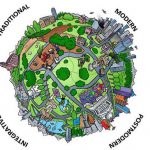What can any of us do to deal with our Earth’s greatest challenges?
We know that in our world there are unnecessary conflicts that are often quite violent and destructive to the lives of innocent men, women, and children. Our natural environment is being degraded, human rights are being disregarded, ethnic groups are being oppressed, immense numbers of people are living in chronic poverty, endemic racism makes life very difficult for so many people, and diseases sometimes spread like wildfires to all ends of the Earth. This should be alarming to people throughout the world, including peoples of all nations, races, and ethnicities, because the world has evolved into a global society where our livelihood increasingly depends on global stability and where distant conflicts can become a threat to peace far closer to home.
What can we do to address these immense challenges? Is there anything that can be done to improve things in the world? The answer is “Yes”, if we have determination, solidarity, and a clear vision. We need to recognize that the root cause for so much unnecessary suffering, death, and destruction is fear, distrust, and hate. All regions and peoples on earth are becoming ever more interdependent and are thus in need of a common system of understanding in order to achieve orderly and peaceful coexistence, communication, and commerce. We need to set achievable goals so that we can incrementally work toward greater mutual understanding and empathy among people who come from different walks of life, different worldviews, and different corners of the globe. We need to develop innovative approaches to fostering deeper understanding and empathy across different communities.
Such an undertaking would be a very ambitious project, and we should not be under any delusion that we are going to actually save the world with our small-scale efforts. The truth is, however, that there are positive and negative developments happening in the world constantly that are caused by people’s choices. Indeed, each of us has some effect on what happens in the world, for better or worse. You would have to agree that things get a little bit worse when we don’t try, and things get a little bit better when we do try to make a difference in this world. If even a small positive impact comes from our work, then it will be worth the effort. Nothing is easy in life, at least nothing that carries important significance. If we believe that our determined efforts will have some measurable positive impact in the long run, then we can make it happen.
We also are seeking to give inspiration and a sense of measured optimism to the readers out there, who are invited to become participants in this project. We do believe that some positive impact can come from our cooperation and from The Enlightened Worldview Project, which is the organization that we’re trying to build, but there is a challenging road to get there.
Let us first take a deeper look at the state of the world that makes this project necessary. The truth is that there is quite a lot of unnecessary suffering and conflict in this world and there are things that we can do to improve the situation to some extent. Of course, the world isn’t perfect, and it never has been. But we don’t need to be fatalistic nor indifferent to the plight of those who are less fortunate than us.
We can acknowledge that there is a wide diversity of situations and states of affairs in the world that range from good to bad and everywhere in between. There are countless examples that one could find of people living in happiness alongside of those who are suffering, of places that are very peaceful and others where wars are raging, and of people living long and plentiful lives in addition to people whose lives are nasty, brutish, and short.
We also acknowledge that sometimes suffering and untimely death is unavoidable, such as when natural disasters like floods, fires, and hurricanes strike. But we nonetheless have to think that there are so many unnatural disasters that could have been avoided if cooler heads had prevailed and if there was more mutual understanding among peoples at the right times and the right places. To cite a prominent example, the holocaust was not inevitable. The slaughter of millions of innocent people could have been avoided if more people had taken seriously the threats of violent authoritarianism and toxic nationalism in Germany in the years prior to WWII.
Even in situations where significant suffering and death was probably unavoidable, we can imagine that things could have been done to minimize the impact. The Irish potato famine was an accident caused by a fungus that was inadvertently introduced to Ireland in the 1840s, but hundreds of thousands of people died who could have been saved if the British authorities had distributed their grain stores appropriately to those in need rather than allowing the Irish people to starve. The purpose of this is not to dig up old wounds from generations ago, but to learn from the past so that we can avoid repeating similar mistakes.
If we look to the future, we can foresee that there are likely impending disasters that will occur unless we make important improvements to the social, political, and economic structures that serve as the foundation of our global civilization. For example, human caused climate change is on course to cause immeasurable damage to cities and agricultural lands and to threaten life on Earth as we know it. There is an abundance of scientific evidence that we humans are degrading and polluting the natural environment in ways that contribute to global climate change. This is being perpetuated by the current political and economic realities that have so far proven difficult to overcome. Theoretically, we could enact political, legal, and economic reforms that would be based on a long-term goal of living more efficiently and more in harmony with nature, which would then minimize the potential for catastrophic climate-induced disasters. This is just one example, and many others could be listed, of the unnatural disasters that can and should be prevented. We only stand a serious chance of heading off these unnatural disasters if people do what is necessary to resolve existing ongoing conflicts.
I am not just preaching to the choir here. Admittedly, those reading this are likely to already agree with much of what is being said here. At the same time, under the current political climate, I don’t expect that many people who don’t believe in human-induced climate change to read this and to change their minds as a result. But this can also be understood as a call to action for the readers to use innovative communicative tactics to reach out to those who don’t embrace science as much and who have rather closed minds on certain things. We can try to build empathy and understanding among people who think nationalistically and tribally and who have suspicion and hostility to other viewpoints and other worldviews. Maybe you have friends, family, and/or parents who have this sort of mindset to an extent. With this project, we intend to develop innovations in communication and understanding so as to build bridges between people of different walks of life and different belief systems. We also hope to foster more acceptance of science and evidence-based approaches in the public sphere so that we can more effectively address the greatest challenges in our world today. This is the least that we can do to work toward a better future for ourselves and for our planet.
What, if anything, do you think can be done to lead to greater peace in this world? Let your voice be heard in the Forum.







